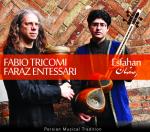

TRICOMI Fabio & ENTESSARI Faraz
Esfahan - Persian Musical Tradition in Bayat-Esfahan
Fy 8194
885016819422
Felmay Records
Iran
Esfahan - Persian Musical Tradition in Bayat-Esfahan
Fy 8194
World Music
885016819422
Felmay Records
Iran
New chapter in our presentation of different sounds of the Middle East, an exploration we stated few years ago with titles of Ottoman, Turkish, Azerbaijani music. This time the caravan lands in Iran. The music on this CD is a small, specific part of the Persian repertoire called "classic", in particular the repertoire of the so-called Bayat Esfahan.
Unlike Western compositions where the writing tends to stifle the creativity of the performer, in the compositions of the Persian masters the freedom of interpretation is possible and highly appreciated as you can testify in this CD that wisely mixes improvisation and compositions.
New chapter in our presentation of different sounds of the Middle East, an exploration we stated few years ago with titles of Ottoman, Turkish, Azerbaijani music. This time the caravan lands in Iran. The music on this CD is a small, specific part of the Persian repertoire called "classic", in particular the repertoire of the so-called Bayat Esfahan.
Classical Persian music, as many other musical traditions, is based on the oral transmission from father to son, from master to student. The repertoire representing the identity of classical Persian music as a whole, in teaching, in learning and in performing is called Radif (Order). We can imagine the Radif as the framework of the entire classical Persian music and the main body of the old melodies, where coexist and interact 12 modal systems: 7 Dastgah and 5 Avaz. Each and every Dastgah and Avaz represents the development of a modal sequence characterized by the concatenation of several Gushe (part), melodic formulas with free or regular metric.
Unlike Western compositions where the writing tends to stifle the creativity of the performer, in the compositions of the Persian masters the freedom of interpretation is possible and highly appreciated as you can testify in this CD that wisely mixes improvisation and compositions.
FARAZ ENTESSARI was born in 1983 in Tabriz, Iran. He began studying Persian music in his hometown at the aged14, in 2000 he starts the study of his instrument, the Tar, with the master Dariush Pirniakan, with whom he studied the repertoire of Master Mirza Hossein Qoli (1854-1916) and the idiomatic repertoire and style of Master Ali Akbar Shahnazi (1897-1985), learning at the same time intensively the Persian music system (Dastgah) with Master Majid Kiani. He graduated in Persian music in Tehran, then continues his studies at the DAMS (Department of Art Music and Drama) of Bologna. Faraz has an intense concert activity and representing one of the most important interpreters of the ancient Persian musical style. FABIO TRICOMI musician and ethnomusicologist, was born in Catania in 1966. Since 1983 dedicated to the research and documentation of the musical aspects related to the Sicilian tradition. His direct experience with traditional musicians led him to deepen the understanding and study of the techniques and performing styles of various instruments, especially following his master Djamchid Chemirani in the study of tombak. He has authored the publication of various texts on music of oral tradition, Medieval music and CD with field-recordings.
Our Playlist
Our olaylist on Spotify, dedicated to P
re Minimalism, Minimalism and Post Minimalism.
© 2025 Felmay Srl - P.I. 06974300011 | Powered by: Riccardo Marino



























